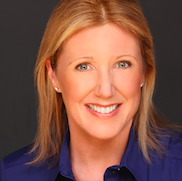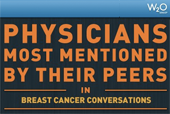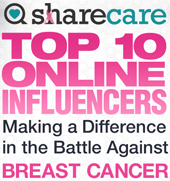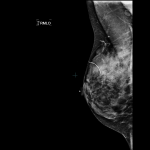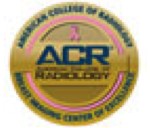Diagnosed with Breast Cancer at Age 29, Lori Kennedy Shares Her Story 20 Years Later
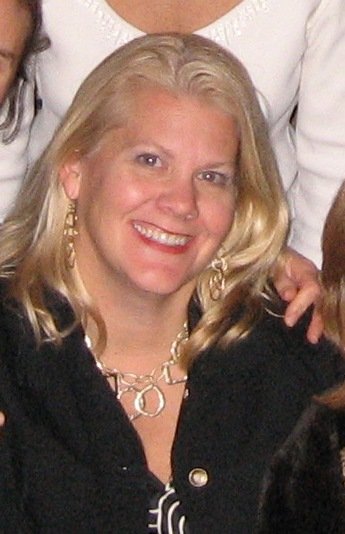 Looking at her today, you’d never guess that my mom friend Lori Kennedy had been through the gauntlet of breast cancer diagnosis and treatment at the age of 29. A mutual friend introduced us several years ago, and after Lori learned that my field is breast imaging, she mentioned that she’d had breast cancer years before. I was intrigued by her story, and thought it would be helpful to share in “The Breast Diaries.”
Looking at her today, you’d never guess that my mom friend Lori Kennedy had been through the gauntlet of breast cancer diagnosis and treatment at the age of 29. A mutual friend introduced us several years ago, and after Lori learned that my field is breast imaging, she mentioned that she’d had breast cancer years before. I was intrigued by her story, and thought it would be helpful to share in “The Breast Diaries.”
The Shock of Diagnosis
In April of 1992 Lori was 29 years old, living the single life in Hoboken and working successfully in sales. She had been dating a man named Bart for several months, and the relationship was going very well.
On a business trip to San Francisco, Lori felt a lump in her right breast while showering. She had never done self-exams, but she felt the lump by chance in the upper outer
breast. She remembers it being somewhere between the size of a pea and a grape. She didn’t think much of it, as she was so young and had no family history of breast cancer. Fortunately, she had a regular check-up with her gynecologist scheduled for soon after her return. At the appointment, Lori mentioned the lump to her doctor as a casual “by the way….” The gynecologist also felt the lump, and referred her to a breast surgeon, a well-known specialist in Manhattan.
The surgeon ordered a mammogram, which was read as negative. She then performed a needle biopsy on the lump in the office; the pathology report came back negative for cancer, but the breast surgeon wanted a specific diagnosis, and outpatient surgery was scheduled to remove it.
When Lori woke from the anesthesia after her surgery, she vaguely recalls the surgeon telling her, “I don’t like the way this looks.” The pathology results would be reported in a
few days, and she’d speak to her at the follow-up appointment. Bart had been waiting at the hospital, and they went to the movies that night. Lori tried to put out of her mind what the surgeon had said, and reminded herself that she had no family history.
Lori arrived alone at the follow-up appointment with the surgeon. Her family was scattered in various parts of the country, Bart was working, and she really didn’t want to make a big deal out of nothing. The surgeon dispassionately informed her that the lump was CANCER, invasive ductal carcinoma, and the margins of the biopsy were positive, meaning that there was more cancer still in her breast. In addition, the lymph nodes under her arm would need to be removed to determine if the cancer had spread outside the breast. Lori was shocked beyond words, and after hearing CANCER, she wasn’t able to focus through much of the rest of the conversation. She called Bart, and he immediately came to meet her at the surgeon’s office. In the cab ride home, Lori broke down for the first time. How could this be happening? She was thin, healthy, she exercised, ate well, no ridiculous partying, NO FAMILY HISTORY! The whole situation felt completely surreal and impossible.
Deciding to Fight
Over the next several days, Lori decided to take action. She read whatever she could get her hands on (this was pre-internet, remember), and sought advice from friends
and family who might have information that could help her. Lori remembers that when she had the presence of mind to ask the surgeon about getting a second opinion, the surgeon seemed offended; this made Lori decide that she needed to find a different doctor, and she consulted with several breast surgeons at all of the large academic centers
in the city. Every surgeon recommended that she undergo a mastectomy (removal of the breast) with immediate implant reconstruction, and a dissection (removal) of the lymph nodes under her arm. They also thought that chemotherapy would be indicated as part of her treatment.
One of Lori’s biggest concerns at this point was whether she would be able to conceive children after all of the treatment ahead of her. Most of the doctors answered
vaguely if at all, and none recommended consulting a fertility expert regarding egg retrieval prior to chemotherapy. One surgeon bluntly said, “Having children? Don’t even think about it.” Wow.
The surgeon that Lori finally chose was an older man at Memorial- Sloan Kettering Cancer Center, who greeted her by saying, “I bet you’re wondering what a young girl like you is doing here.” Besides having an excellent reputation, this surgeon felt compassion for her awful predicament. He was the right one.
Treatment
Within four weeks of her diagnosis, the final surgery was performed. The pathology results were heartening; there had been no spread to the lymph nodes! The tumor was still Stage I! Lori then underwent several months of chemotherapy. She says that the chemoregimen was not the toxic form that most women receive today, and although she
was nauseous and fatigued, she never lost her hair. She was very glad for that.
Bart asked her to marry him, and she planned her wedding through chemo! Lori continued to work,and aside from her boss, she was unsure about sharing her problem with anyone else other than family and friends. She was one of two women in the sales force of her company at that time, and appearing less than capable was not a welcome prospect to Lori. As a young career woman, she was uncertain as to how to navigate the issue. In retrospect, Lori wishes she had given herself more of a break, and allowed
herself some time off to heal more peacefully.
Life After Treatment
Lori and Bart were married in May, 1993. Her breast surgeon at Sloan Kettering gave her some hope with regard to having children, and told her there was a chance
she could conceive, but he wanted her to wait for five years to watch for a recurrence of the cancer. Lori and Bart followed instructions.
During that time, Lori looked for any information, support or resources available for young women (under 40) facing a breast cancer diagnosis, and the special issues pertaining to them. She could find nothing! And there were no internet forums or discussion boards at that time. She discovered a group called SHARE (Self-help for women with Breast or Ovarian Cancer), based in New York, which provided support and guidance for women with breast cancer. Lori became involved in this organization, and
she helped found a support group specifically for younger women, which held seminars on fertility and child-bearing after cancer. She was asked to serve on the board of SHARE, and her profile in the breast cancer community grew exponentially.
Lori became the face of young women diagnosed with breast cancer on a national media platform, and has been interviewed on numerous occasions by major national print and television outlets. Her portfolios of clippings from those days in the mid to late nineties are enormous and extremely impressive. She was a woman with a mission: to help other women out there walking the same terrifying path that she had walked.
At the 5-year mark when she was cancer-free, Lori and Bart took a fabulous vacation to Hawaii. Against the odds, Lori got pregnant right away, and gave birth to a beautiful, healthy baby girl! Their joy was boundless. A few years later, Lori conceived again, and had a second beautiful and healthy girl. Today, Lori and Bart’s daughters are 8 and 13, adorable and talented and so very precious.
It’s now years later (20 years since her diagnosis!) and Lori feels blessed by her good health and good fortune. Many of the women she became close to at SHARE have died of their disease, which has caused Lori much grief and pain. Lori is a breast cancer survivor, but she feels that this doesn’t define her anymore. In fact, many of her newer acquaintances have no idea that she’d had breast cancer. She told me, “When you are first diagnosed, you never think the day will come when you don’t think about breast cancer. Now, it’s not my focus.” She is vigilant about having her annual mammogram on her remaining breast, and her doctor sends her for supplemental high-risk screening with breast MRI. Unbelievably, she often has to do battle with her insurance company to cover the test.
Advice
When I asked Lori what advice she had for women based upon her experience, she made the following points:
- If you feel a lump, act on it. Most lumps will not be cancer, but if it is, you have a much better chance of surviving if it is diagnosed early.
- She disagrees with the recommendations made by the government task force on mammography in 2009 (USPSTF), which stated that women should wait until 50 to have their first mammogram, and then have it every other year. “I think that’s ridiculous, crazy even.” Even though her cancer was not seen on her mammogram, she knows that most cancers are found mammographically.
- She also thinks that the task force is wrong to recommend that physicians not perform clinical breast examinations on their patients. If she went to a doctor who
said they were following the task force recommendations and they didn’t perform a breast exam, she would insist. - If a friend is diagnosed with breast cancer, and you want to help, here are a few suggestions:
- Go with your friend to important appointments, take notes, and be her advocate.
- Offer a listening ear to your friend whenever she needs to talk about what she’s going through.
- Help her find and research relevant support groups and reliable websites.
- Help her organize her medical bills and insurance documents into a workable system. Lori said that aside from having cancer, the worst part of her
experience was sorting through and dealing with the overwhelming paperwork.
I’m inspired by my friend, and I am so thankful that she found that lump as early as she did. You are a gift to your family and your girlfriends, Lori! Thank you so much for sharing your story.
Tags: breast cancer, breast cancer screening, breast cancer survivor, breast exam, breast lump, breast MRI, breast self exam, breast ultrasound, BSE, Lori Kennedy, mammogram, USPSTF

